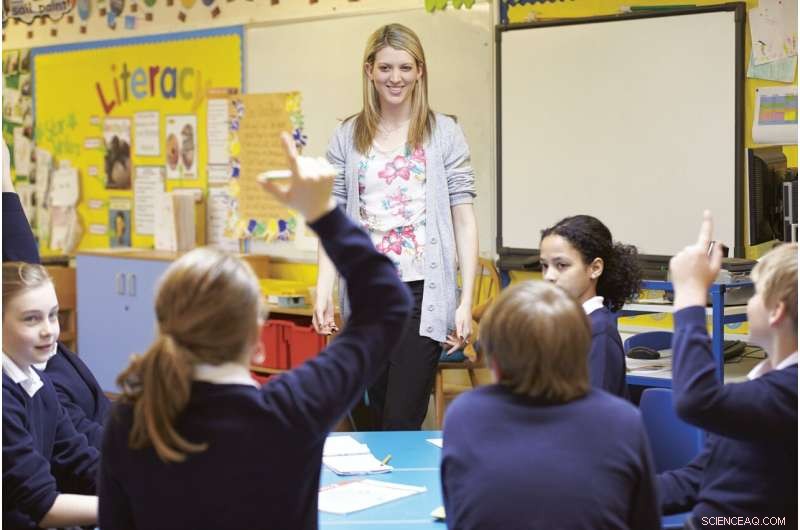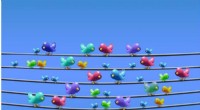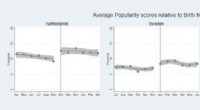
Wetenschap
Studie gaat dieper in op hoe leraren op katholieke scholen een evenwicht vinden tussen het genereren van inkomsten uit onderwijs en het voldoen aan beroepsvraag

Krediet:Pixabay/CC0 publiek domein
Veel leraren zouden bevestigen dat ze tot het beroep geroepen waren om studenten op te leiden en voor te bereiden op het leven, niet alleen om een economische dienst te verlenen. Maar nu het onderwijs in toenemende mate gepolitiseerd en gemonetiseerd wordt, worden veel opvoeders getrokken tussen het verschaffen van een economisch goed en doen waar ze van houden. Een nieuwe studie van de Universiteit van Kansas wees uit dat dit vooral geldt voor katholieke schoolleraren, die strategieën hebben ontwikkeld om hun roeping en beroep in evenwicht te brengen.
Het onderwijs is de afgelopen twee decennia beïnvloed door het neoliberalisme en het post-industriële denken, waarbij de nadruk ligt op meetbare resultaten, gestandaardiseerde tests en regelmatige inschrijvingen. Het debat over de vraag of onderwijs moet worden gezien als een handelsartikel of een publiek goed is aanwezig in alle scholen, maar Heidi Hallman was geïnteresseerd in hoe het zich afspeelde op katholieke scholen, wiens missie het is om studenten op te leiden, maar ook om hen door de leer van de kerk te leiden en om een publiek goed te bieden voor alle studenten, hoewel ze afhankelijk zijn van collegegeld.
Tijdens de pandemie hoorde Hallman, hoogleraar curriculum en lesgeven aan de KU, over gezinnen, waaronder niet-katholieken, die hun kinderen naar katholieke scholen stuurden waar ze persoonlijk les gaven.
"Ik vroeg me af hoe deze leraren de uitdagingen zien waarmee ze worden geconfronteerd in vergelijking met hun tegenhangers op de openbare school," zei Hallman. "Ik hoorde sommigen klagen over het verlies van gemeenschap. We hebben sport, of de online gemeenschap waar we de hele wereld kunnen bereiken, en ik denk dat het moeilijk is voor religieuze scholen om te accepteren, vooral met de sluiting van zoveel katholieke scholen en het verlies van buurt en gemeenschap."
Hallman interviewde 35 leraren en beheerders van basisscholen, middelbare scholen en middelbare scholen voor het onderzoek, gepubliceerd in het tijdschrift International Studies in Catholic Education .
Omdat veel katholieke scholen tijdens de pandemie hun deuren open hielden, zagen de scholen vaak een toename van het aantal inschrijvingen. Veel nieuwe studenten waren niet katholiek, maar de scholen hebben hun missie gesteld om iedereen te onderwijzen en hadden het gevoel dat hun spirituele component iets zou kunnen bieden aan de gezinnen die ze anders misschien zouden missen. Het droeg echter ook bij aan de perceptie van onderwijs als handelswaar, zei Hallman.
"Omdat onderwijs 'op de markt' is, hebben we de neiging om onderwijs als een product te zien. Dat gebeurt ook in het hoger onderwijs", zegt Hallman. "We willen studenten niet als klanten behandelen, maar er waren mensen die blij waren dat studenten en gezinnen naar hun school kwamen, maar ook een scepsis, alsof mensen gewoon naar school aan het winkelen waren."
The study participants revealed three themes in their responses to balancing teaching and vocation and how they dealt with the neoliberal and postindustrial influences on American education and policy.
First noted was technocratic professionalism. With a constant focus on professional development and skills, American education has emphasized that this type of training will develop the best educators. However, several of the teachers, especially the younger ones in the study, questioned that approach. Respondents often wondered if allowing them to draw on their faith and love for working with young people would make them more effective educators than continuously taking skills training classes.
Respondents also noted competition from the marketplace. Teachers could feel there were many outside forces pulling students away from the community provided by a Catholic school. Educators noted the pull of athletics outside the school or non-school related activities and options available via the internet and social media that resulted in a "watering down," or de-investment, of activities and teachings of the school and church. Even though schools often continued in-person education, church services were often canceled or reduced in frequency, and educators noted many people, including families of students, have not come back. They also reported fearing that students would leave the schools as public schools returned to in-person learning after the initial stages of the pandemic.
Finally, respondents reported being concerned with optimizing the student experience. In addition to state-mandated curriculum, Catholic school teachers are required to impart the teachings of the church. That part of the job often appealed to those saying faith helped bring them to the job, and that it could be a way to serve everyone, but also could ring hollow.
"If a family didn't have a religious identity, the teachers mentioned how maybe the school could offer them that, but there was also a concern that faith might simply be an add-on, or like going to the grocery store to get something you need," Hallman said.
The educators were not territorial, she added, and often looked for ways to make non-Catholic students and families feel welcome.
The findings provide insight into how Catholic school teachers and administrators view their roles in society, a topic which has been largely overlooked by academic researchers, Hallman said. Their dedication to their work, and especially reluctance to view education as a commodity while drawing on their faith as a way to help better serve students, can provide a model for preparing teachers for all schools. As opposed to simply relying on teaching a set of skills and insisting they meet mandates and measurable results, teachers could be viewed more holistically, in a way that allows them to use what inspires them, whether religious or otherwise, to be better teachers and continue to grow, she added.
"It gave me hope that religious schools can seek their religious mission, but also welcome others and maintain their commitment to the common good, even among pressures to keep enrollment up and seeing neighboring Catholic schools close," Hallman said. "These teachers were very hopeful. They often had lower wages but were very dedicated to their vocation, and I found that refreshing to hear from people in the pandemic era, when there are so many pressures on teachers." + Verder verkennen
Exploring the mental health impacts of COVID on Australian teachers
 Een nanotech-sensor die moleculaire vingerafdrukken omzet in streepjescodes
Een nanotech-sensor die moleculaire vingerafdrukken omzet in streepjescodes Onderzoekers produceren goedkope handdesinfecterende middelen uit afval
Onderzoekers produceren goedkope handdesinfecterende middelen uit afval Hoe het vriespunt van een mengsel te berekenen
Hoe het vriespunt van een mengsel te berekenen 100 procent biobased, transparant, en thermisch stabiel polyamide
100 procent biobased, transparant, en thermisch stabiel polyamide lichtgewicht, slagvaste honingraatstructuren kunnen voelen wanneer ze beschadigd zijn
lichtgewicht, slagvaste honingraatstructuren kunnen voelen wanneer ze beschadigd zijn
 NASA zag de eens orkaan Aletta intensiveren, nu snel aan het verzwakken
NASA zag de eens orkaan Aletta intensiveren, nu snel aan het verzwakken De nieuwste duurzaamheidsdoelstellingen van de VN doen meer kwaad dan goed voor het milieu, wetenschappers waarschuwen
De nieuwste duurzaamheidsdoelstellingen van de VN doen meer kwaad dan goed voor het milieu, wetenschappers waarschuwen Giftige rupsen wekken Nederlandse gezondheidsangst op
Giftige rupsen wekken Nederlandse gezondheidsangst op Menselijke impact op het ecosysteem van Nieuw-Zeeland
Menselijke impact op het ecosysteem van Nieuw-Zeeland  Hoe te om Vogels van de Patio af te houden
Hoe te om Vogels van de Patio af te houden
Hoofdlijnen
- Waarom hebben zoveel van onze huisdieren overgewicht?
- Cephalization of Earthworms
- Wat zijn de vier organische moleculen die in levende wezens worden gevonden?
- Wat zijn de vier stikstofhoudende bases van DNA?
- Hoe erg is zwarte schimmel,
- De nadelen van biotechnologie
- Verborgen microbioom versterkt dieren, ook planten
- Wetenschappers ontgrendelen de code om betere erwten te kweken
- Structuur van primaire optogenetische tool onthuld
- Onderzoek toont aan dat bijna geen universiteiten klaar zijn om de socialemediacrisis aan te pakken

- Hoe radicale fracties te vereenvoudigen

- Analyse van Trumps tweets onthult systematische omleiding van de media

- Adolescenten die relatief ouder zijn dan hun klasgenoten zijn populairder

- Waarom Chuck Yeager de beste piloot aller tijden was

 Hoe oplosbaarheidsregels vast te stellen
Hoe oplosbaarheidsregels vast te stellen NASA lanceert raket op zoek naar antwoorden op poollicht
NASA lanceert raket op zoek naar antwoorden op poollicht Studie onthult geheimen van vloeistofachtige warmtestroom in vaste halfgeleider op nanoschaal
Studie onthult geheimen van vloeistofachtige warmtestroom in vaste halfgeleider op nanoschaal De economische nasleep van pandemieën
De economische nasleep van pandemieën Magnetische kracht
Magnetische kracht Uit onderzoek blijkt dat sociale steun studenten helpt om overbelasting van taken te overwinnen
Uit onderzoek blijkt dat sociale steun studenten helpt om overbelasting van taken te overwinnen Plantafweerlaag heeft onverwacht effect op vluchtige stoffen, studie vondsten
Plantafweerlaag heeft onverwacht effect op vluchtige stoffen, studie vondsten Inzichten uit complexiteitswetenschap:meer vertrouwen in zelforganisatie nodig
Inzichten uit complexiteitswetenschap:meer vertrouwen in zelforganisatie nodig
- Elektronica
- Biologie
- Zonsverduistering
- Wiskunde
- French | Italian | Spanish | Portuguese | Swedish | German | Dutch | Danish | Norway |

-
Wetenschap © https://nl.scienceaq.com

